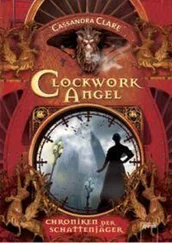Otthild touches Gris’s face, his smooth, blank cheeks. “You see? We are not without want. But we are peculiar and refined in our ways of wanting, since vulgar food necessity is satisfied.”
Gris cannot bear to look at her heart with its slow, clanking beating. He closes up her chest with shaking hands and sits on the edge of her bed.
“Would it help,” Otthild says, “if I had a knife in my side?”
She draws his face down to hers, and he feels the hard bone buttons beneath him. He looks at her red hair coiled on the pillow as he presses into her, and thinks of the girl with the braid whom he had only loved once, who had, afterwards, stared at her stucco ceiling and told him that Crivelli sometimes used chalk rendered in glue made from rabbit-fat to make the tears of his Pieta. It dried hard and clear, so that if you could touch one of his paintings, you would feel the tears falling beneath your hands, falling like tiny stones of grief, like little buttons of bone.
* * *
It is properly always dark after sex. Gris wants to feel guilty, but he feels nothing. After all, a businessman and a prostitute are as near a thing to an archetype as he can think of these days. A salaryman and whore walk into a bar—stop me if you’ve heard this one. He stops. He looks over his naked shoulder at her, at her four small buttons. Her hair falls over one heavy breast. She pulls a strip of drywall-pastry and chews it thoughtfully.
“What can I pay you?” he sighs. “What do you want?”
She rolls onto her stomach and smiles softly, her lips without paint, pink and thin. “Most of us in the City are collectors,” she says. “Some are monomaniacal, like my mother. But when the sun is always warm and your house is made of food, desire curls in on itself and finds other objects. I know a woman by the butter-pits who collects calf’s tails. She has a whole coat of them. I collect tickets.”
Gris’s mouth opens slightly. He pulls his creased return ticket out of his discarded coat’s pocket.
“But if I give it to you, I can get another, for the morning train, can’t I?”
Otthild shrugs. “You buy a ticket to enter the station these days, not the train. But the glass booth is well within the arch. Maybe they would sell you a new one. Maybe they would let you inside. Maybe not. We are often perverse. Maybe the Station is full of Midwesterners trying to buy a ticket home with everything they own, even flesh, even bone. Perhaps that long-dead man did not lose his hand in an ice factory, but to buy a ticket here, or a ticket back. All of that is your business, curious histories, and I do not collect those.”
She kneels beside the bed and clicks open the jeweled boxes, one by one. Gold, silver, ivory. Opal, onyx, lacquer. Inside them all are countless tickets, old and new, with magnetic strips, without. Some have the City of Blind Delight as a destination, others are simpler: New York to St John’s, Odessa to Moscow, Edinburgh to Glasgow. But there are carefully inked and stamped tickets from the City of Envious Virgins to the City Without Roses, from the City of Variable Skylines to the City of Mendicant Crows. There is one, almost dust, from Venice to the City of False Perspective. She opens a box for him, of polished steel, tableware melted into a cubical shape.
Gris reaches out and strokes her sternum, his eyes sliding closed. He feels her fastened chest, the buttons like hardened tears. He lets his ticket fall into the box. Shadows drift over the neat printing: The City of Blind Delight to Chicago, Midnight Express.
* * *
There is a train which passes through every possible city. It folds the world like an accordioned map, and speeds through the folds like a long white cry. Of necessity, this train passes through Chicago, the City of Winds, a city which was once a lake-bed, and even now, if you were to dig far enough beneath the railroad tracks, you would find the thin, translucent skeletons of monstrous fish with fins like scythes.
A woman in black glasses stands with a bag full of strawberries and wheat-flour and frozen trout in her arms. She watches trains silver past while the cream and gold of Union Station arches behind her, as she has done every day since she moved here from California. A long, pale car screeches into the platform before her; she does not look at the track number, or the arcane code of the letters blazing on the side. With only a small hesitation, as she shifts the weight of her groceries from one hip to another, she steps through the doors that open and close like arms. Light shines through the glass ceiling and illuminates the spot where she stood just a moment before, like an afterthought.


OLD FOSS IS THE NAME OF HIS CAT
by David Sandner
He has many friends, laymen and clerical;
Old Foss is the name of his cat;
His body is perfectly spherical,
He weareth a runcible hat.
“How Pleasant to Know Mr. Lear” —Edward Lear
Old Foss watched the Old Man out barefoot in his nightshirt ranting in the rain; at least the rain had chased away the boys throwing mud and rocks. The Old Man had black stains along his back and a welt on his forehead, not that he noticed. But as night pushed over the town, growing from shadows leaning along the ramshackle red tile roofs, darkness spreading like ink across a tabletop, Old Foss knew there were worse things than rain or boys with rocks. Soon, the Jumblies would rise from the water’s edge to bring the Old Man to sea in a sieve. And anyone who goes to sea in a sieve, of course, never returns. They sink and they drown.
The rain wept against the glass as Old Foss watched impassively behind the window. The Old Man ran back and forth across the cobbled street, his long white nightshirt soaked and clinging to his ungainly frame, his paunched belly and skinny pale legs. His long bedraggled beard leaked, sloughing off water when he shook his head and bellowed: “Where is my Jumbly Girl?” The Old Man knocked on every door he came to, but no one answered for they knew the old Englishman too well.
At first, when the fugues came on, the locals had only shaken their heads at him, then argued with him in broken English or too fluent Italian, especially when the rain came up fast. They pushed him towards the villa he and Old Foss rented; but when the confusion came upon him he would only look at them uncomprehendingly, or look at their doors long after they had shut them with the oddest expression of thwarted desire, then he would wander away again and knock on another wrong door. For no one could see the Jumblies but him and Old Foss. None could know of his time with his Jumbly Girl but Old Foss and himself. Old Foss and he is how it should be for the Jumbly girl would bring him only death for all her promises. Why couldn’t he see that, Old Foss thought crossly, twitching his tail, and was it really so much as all that to love a Jumbly Girl?
* * *
The sun reflected blindingly on the sand and burst across the blue water in shimmers and rolling spots of light, like crystal broken on tile, like sparks shooting and spinning into the air from a roaring fire, like nothing the Old Man could capture on his canvas.
“It’s like nothing, Old Foss, why can’t the poets ever say that? It’s like nothing we can see or say, like something more than we can know, like less than I can rhyme and more than I can show.”
Читать дальше














